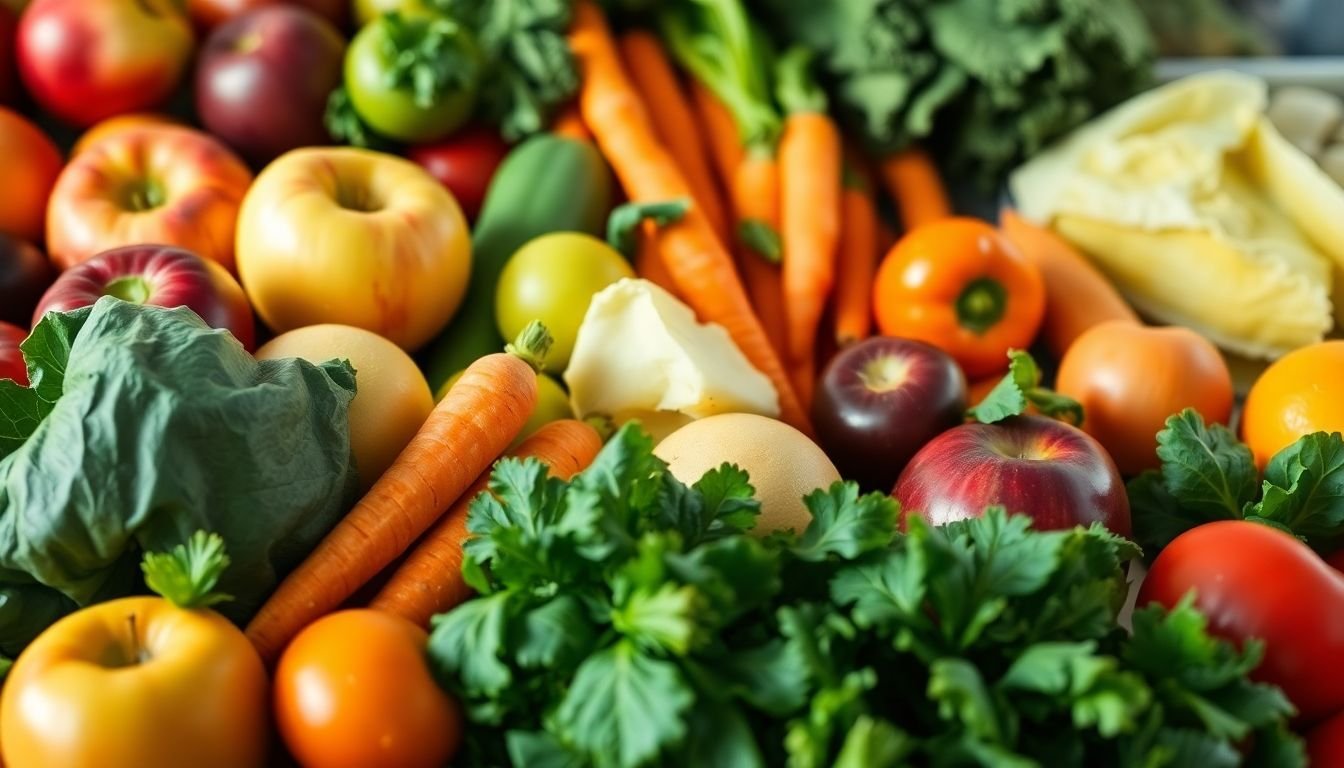Choosing what food to buy can be confusing. You want to eat healthier, but you also hear a lot about organic foods. What makes them different? One key thing is that eating more fruits and vegetables, whether they’re organic or not, is good for your health.
But here’s an interesting fact: most people have pesticide remnants in them from the food they eat, mainly fresh produce. Does this make you think twice about what lands on your plate? Our guide will help you figure out “What Food Is Worth Buying Organic.” We’ll show why it matters and how picking the right items can lower those pesky pesticide levels.
Ready to learn more? Keep reading.
Key Takeaways
- Eating organic foods lowers your exposure to pesticides. Dr. Alex Lu found pesticides in most people from non-organic produce. Switching kids to an organic diet can reduce their pesticide levels fast.
- The Dirty Dozen list by the Environmental Working Group (EWG) helps you choose fruits and vegetables with fewer pesticides. It’s updated yearly, including items like strawberries, spinach, and apples.
- Buying organic protects your health and supports better farming methods. You can find good organic options at farmers’ markets by asking sellers about their practices. Always check the EWG list for guidance on which produce to buy organic.
Importance of Eating Organic Foods

Eating organic foods cuts down on your exposure to pesticide sprays. These chemicals can be harmful and are found more in regular farm products than in organic ones.
Dr. Alex Lu’s Research Findings
Dr. Alex Lu, a professor at Harvard University, found something you should know about your food. He discovered that most people have pesticide residues in their bodies. These come from the fresh fruits and vegetables they eat.
This means even when you think you’re eating healthy, those pesticides can still get inside you.
His research shows why choosing organic produce is a smart move for your diet. Organic farming does not use the synthetic pesticides found in conventional farming practices. So, eating organic means less pesticide exposure for you and your family.
Dr. Lu’s findings make it clear; if reducing chemicals in your body matters to you, opting for organic foods can help achieve that goal.
Benefits of Consuming Organic Foods for Children
Eating organic foods can make a big change for kids. Research shows that switching to an organic diet can lower the levels of pesticides in children’s bodies in just five days. This is huge because kids are still growing, and chemicals from non-organic food can affect their development.
Imagine feeding your child fruits, veggies, and meat that don’t carry the extra baggage of harmful substances. That’s what going organic offers.
Research shows that switching to an organic diet can lower pesticide levels in children’s bodies in just five days.
From personal experience, I’ve seen changes too. My nephew used to have trouble focusing and was always tired. We decided to switch his diet to all-organic foods, thinking it might help.
And it did! In a week or so, he became more active and could pay attention better at school. Stories like this are common among parents who choose organics for their families.
Understanding the Dirty Dozen
The Dirty Dozen list helps you pick fruits and vegetables with less pesticides. The Environmental Working Group updates it every year to guide your grocery shopping for safer choices.
The Environmental Working Group (EWG) List
The Environmental Working Group (EWG) makes a list every year. They call it the “Dirty Dozen.” This list has 51 foods on it. They rank these foods by how much pesticide they have. The food with the most pesticide is number one.
Pesticides are chemicals that kill bugs but can be bad for people too.
You can use this EWG list to make better choices at the grocery store. If you want to eat healthier, look at this list before you buy fruits and vegetables. It tells you which ones have lots of pesticides and might be worth buying organic instead.
Using this list helps keep your family safe from harmful chemicals found in some non-organic produce.
Updated Inclusions in the Dirty Dozen
This year, the Dirty Dozen list saw some new additions. They now include leafy greens like kale and various types of squash, which could surprise you. Here’s a breakdown:
- Kale has made it onto the list. Pesticides can stick to its leaves.
- Squash varieties also joined the ranks due to pesticide levels.
- Strawberries still top the list as they did before, holding on to their spot because of heavy pesticide use.
- Spinach is next, with similar issues as strawberries.
- Apples have been a long-standing item on this list because they often get sprayed with pesticides.
- Grapes make the list too; those tiny fruits can carry pesticide residues.
- Peaches are another fruit you might want to buy organic because of pesticides.
- Cherries have issues with pesticides, keeping them on this updated list.
- Pears also join the list for similar reasons as apples and peaches.
- Tomatoes need careful washing if not bought organic due to pesticide use.
- Celery makes it because it’s hard to wash off all the chemicals it absorbs.
- Potatoes round out the list; those underground grow more susceptible to absorbing pesticides from soil.
These updates remind us how important it is to stay informed about where our food comes from and how it’s grown. Consulting lists like The Dirty Dozen helps in making smarter choices at grocery stores or farmers’ markets, especially when looking for fruits and vegetables that are best bought organic to avoid pesticide exposure.
Importance of Using the EWG List for Informed Decisions
The EWG list is like a guide for you at the grocery store. It tells which fruits and vegetables have lots of pesticide contamination. You want to eat healthy, right? This list helps you choose better.
It points out which produce to buy organic. This way, you avoid those nasty chemicals.
Using the EWG’s Dirty Dozen list helps families make safer and healthier choices.
Local farms often follow organic practices even if they don’t have an official label. The EWG list supports your decision here as well. It gives confidence when buying from farmers markets or joining a food co-op where details about pesticides might not be clear.
You know what’s best for your health with this list in hand.
Organic Options at Farmers’ Markets
Farmers’ markets are great places to find fresh and organic foods. But not all products there are organic or without chemicals. You should ask sellers about their farming methods. Some may use regenerative farming, which helps the earth and grows healthy food.
Others might be USDA certified organic, meaning they follow strict rules to avoid harmful pesticides.
I once visited a market where I found both types of vendors. Chatting with them, I learned about their crops and animals. They used no bad chemicals and let animals graze freely. This experience showed me that asking questions is key to getting the best organic options at farmers’ markets.
The Dirty Dozen List
The Dirty Dozen List shares which fruits and vegetables have the most pesticides. Check it out to pick safer foods.
Fruits and Vegetables Included in the List
Choosing which fruits and vegetables to buy organic can make a big difference in your health and the environment. To help you make informed decisions, here’s a guide to the fruits and vegetables that you should prioritize buying organic. These selections come from the Environmental Working Group’s Dirty Dozen list, a reliable resource for determining which produce has the highest pesticide levels.
Fruits and veggies on this list have been tested and shown to contain pesticide residues more often than other types. Buying these organic can reduce your exposure to harmful chemicals.
| Fruits and Vegetables | Reasons to Buy Organic |
|---|---|
| Apples | High pesticide residue |
| Strawberries | Chemical sprays common |
| Grapes | Pesticides in skin |
| Celery | Holds onto pesticides |
| Peaches | Thin skin absorbs more |
| Spinach | High levels found in tests |
| Sweet bell peppers | Pesticide concentration |
| Imported nectarines | High residue levels |
| Cucumbers | Surface pesticides |
| Potatoes | Absorb chemicals easily |
| Cherry tomatoes | Chemical treatments common |
| Hot peppers | High pesticide use |
| Domestic blueberries | Frequent chemical sprays |
| Lettuce | Pesticides cling to leaves |
| Imported snap peas | Heavy treatments |
| Kale / Collard greens | Commonly found residues |
| Domestic cherries | High pesticide levels |
| Pears | Easily absorbs pesticides |
By choosing organic for these fruits and vegetables, you’re not just helping protect your health; you’re also supporting farming practices that are better for the planet. Farmers markets often offer a wide range of organic options, providing a great way to get fresh, locally-sourced produce while reducing your exposure to harmful pesticides.
Conclusion
You now know which foods to buy organic. The Dirty Dozen list from EWG guides you. It shows fruits and veggies with the most pesticides. Kids eat better and avoid chemicals by choosing these organic options.
Asking about farming methods at local markets helps too. You make smart choices for health by picking certain organic foods over others.
FAQs
1. What does it mean when food has an organic certification?
Organic certification, such as USDA organic, signifies that the food item was produced following specific guidelines set by the Department of Agriculture. These rules involve regenerative agriculture practices that are different from conventional agriculture and aim to protect farmworkers and the environment.
2. Why should I consider buying organic foods?
Buying organic can have health benefits like reducing exposure to pesticide residues and antibiotic-resistant bacteria, which is common in non-organic livestock farming. The Environmental Protection Agency regulates these substances but some prefer taking extra precautions for a healthier diet.
3. Are all types of food worth buying organic?
Not necessarily. For instance, there’s a list called “Clean Fifteen” which includes fruits and vegetables least likely to be contaminated with pesticides – they might not need to be bought organically. On the other hand, items like hot peppers or chicken breasts could potentially benefit more from being grown or raised organically.
4. Does buying organic always mean higher costs?
While often true due to the costlier agricultural system involved in producing them, you can find affordable options at places like Costco, Walmart or online at Thrive Market or target.com; even better if you buy frozen produce or ready-to-eat meals during sales before expiration dates.
5. Can I still eat healthy without going fully organic?
Absolutely! Healthy eating involves balanced diets rich in fruits, veggies, lean meats like chicken breast or seafood and dairy products whether they’re conventionally produced or not; just remember to check nutrition facts labels for information on what you’re consuming.
6. How else can I support sustainable farming besides buying certified products?
You could consider supporting Community Supported Agriculture (CSA) programs where consumers directly purchase shares of a local farm’s harvests; this way you get fresh seasonal produce while promoting grazing methods beneficial for farm animals’ wellbeing and environmental protection.
- Discover 10 Employee Health Benefits Cheaper Than Insurance In 2024 - November 9, 2024
- 4 Common Money Mistakes Parents Make And How To Avoid Them - November 9, 2024
- Mastering Your Retirement Strategy: Essential Steps For Financial Security - November 9, 2024
















